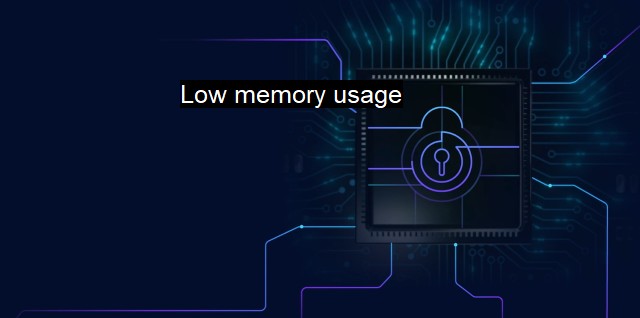What is Low memory usage?
Why Low Memory Usage is Crucial for Modern Cybersecurity and Antivirus: Understanding the Advantages and Disadvantages
In the context of cybersecurity and antivirus software, the term "low memory usage" refers to the amount of physical memory or RAM (random-access memory) consumed by a particular program or process to perform its operations. Ideally, efficient software uses as little memory as possible, leaving ample space for other applications to run well.Memory usage is a critical factor in the performance of a system, as it influences speed and responsiveness. When a program uses a large amount of memory, it might slow down or even disrupt other functions by starving them of the resources needed. This creates a conflict known as a 'memory bottleneck.'
With cybersecurity software like antivirus programs, effective performance is crucial. They operate by continuously scanning files to preemptively identify and mitigate potential threats. This continuous operation could require substantial memory usage which might take a toll on the overall performance of the system, making the device sluggish and unresponsive.
It bears noting that low memory usage isn't necessarily an indicator of an effective antivirus tool. An antivirus software may offer low memory usage but fall short in detecting and eliminating threats. Conversely, a robust, comprehensive antivirus may require more memory to perform efficiently. it’s deemed unnecessary for security applications to consume an excessive amount of memory in this age of advanced technologies.
These days, developers strive to create antivirus algorithms that are powerful in threat detection without being memory hogs. They implement strategies such as signature-based detection and heuristic or behavioral analysis, designed to identify and neutralize malware efficiently, all while minimizing memory usage and ensuring seamless system performance. Optimized antivirus software can work intelligently, scanning potentially dangerous files while your system is idle, and stopping the scanning process when you need more processing power for other tasks.
The use of cloud-based antivirus software is also becoming rampant. This type of software relies on remote servers for much of their processing, thereby reducing the load on the physical memory of user's devices. Thus providing high levels of protection while maintaining low memory usage.
While considering cybersecurity software, low memory usage should be a defining factor but not the only one. A holistic view of software's performance, its effectiveness in identifying and neutralizing threats, and its impact on system performance should be considered. It's not just about how much memory a program uses- it's also about whether the memory consumption leads to an improvement or degradation in system performance.
Low memory usage in the context of cybersecurity and antivirus software refers to efficient utilization of the system's memory to perform the necessary operations. While it is a crucial aspect, it's not the standalone defining factor of an effective antivirus solution. Low memory usage needs to be assessed alongside other parameters like overall performance and, most importantly, the primary job of threat detection and neutralization, to evaluate the complete worth of an antivirus tool. Today, low memory-usage cybersecurity solutions prove essential in balancing resource usage and staying protected in the digital landscape. To get the best out of such a security solution, you should consider the right balance between memory usage, system performance, and security effectiveness.

Low memory usage FAQs
What does low memory usage mean in the context of cybersecurity and antivirus?
Low memory usage in the context of cybersecurity and antivirus refers to the amount of computer memory or RAM that the antivirus software is utilizing to run its scan and detection processes. A low memory usage antivirus program means that it uses a small amount of memory resources to conduct its scanning activities, allowing other applications and programs to operate smoothly without any interruptions.Why is low memory usage important for antivirus software?
Low memory usage is essential for antivirus software because it helps to prevent any significant impact on the computer's performance. If the antivirus program takes too much memory and resources, it can slow down the system, making it challenging to execute other processes. A low memory usage antivirus program ensures that users can run other programs and applications without causing any lag or delay.How can I check the memory usage of my antivirus software?
To check the memory usage of your antivirus software, you can open the task manager on your computer and navigate to the "Process" tab. Look for the antivirus program and check the memory used by the process. Alternatively, some antivirus software may have a built-in feature that indicates the amount of memory it is using.Can having low memory usage affect the effectiveness of antivirus software?
No, having a low memory usage does not affect the effectiveness of antivirus software. The primary function of antivirus software is to scan, detect and remove malware from the system. The memory usage of the antivirus software only determines how many resources it requires to conduct its activities. However, it is crucial to note that the effectiveness of antivirus software is determined by its ability to detect and remove malware accurately, not by its memory usage.| | A | | | B | | | C | | | D | | | E | | | F | | | G | | | H | | | I | | | J | | | K | | | L | | | M | |
| | N | | | O | | | P | | | Q | | | R | | | S | | | T | | | U | | | V | | | W | | | X | | | Y | | | Z | |
| | 1 | | | 2 | | | 3 | | | 4 | | | 7 | | | 8 | | |||||||